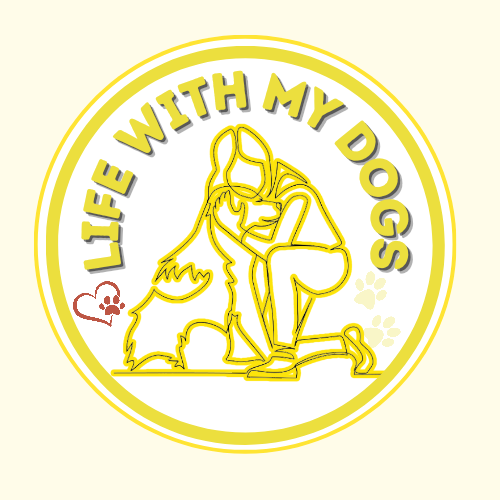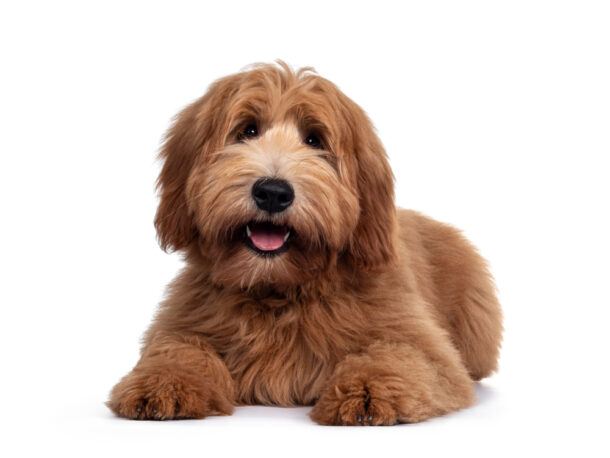LifeWithMyDogs is supported by our audience. When you purchase through one of our links, we may earn a small affiliate commission. As an Amazon Associate I earn from qualifying purchases. Your cost is not affected.
**********
Basset Hounds are a distinct and recognizable breed known for their remarkable sense of smell and enduring presence in various cultures around the world. With their long, velvety ears and soulful eyes, these dogs carry a certain appeal that has captured the hearts of dog lovers for centuries.
Originating from France, Basset Hounds were bred for their tracking and hunting abilities. They used their powerful noses to follow scents over long distances. Despite their working dog heritage, they have become beloved companions in homes due to their gentle and amiable nature.
20 Facts About Basset Hounds: Unveiling Their Unique Characteristics
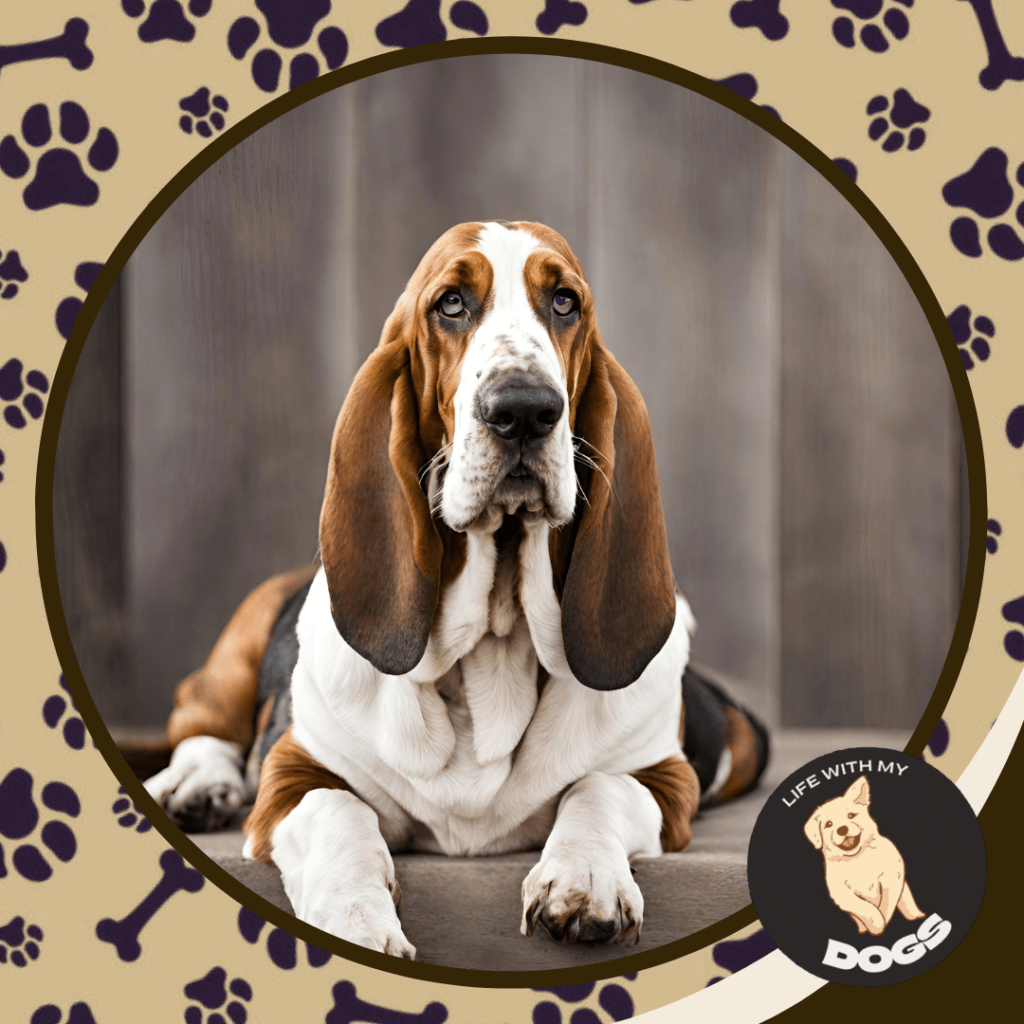
Understanding Basset Hounds goes beyond their droopy demeanors and includes their requirements for exercise, nutrition, and care. This breed’s characteristic short legs and long body require specific attention to prevent health issues, while their friendly temperament makes them great family pets. The commitment to their grooming is moderate, focusing on their ears and eyes to prevent infections due to their unique structure.
Their popularity extends beyond the family unit, becoming icons in various media and recognized by breed clubs worldwide.
Key Takeaways
- Basset Hounds possess a strong olfactory ability and a rich history, stemming from their French hunting origins.
- Their distinct physical features necessitate special considerations for health, exercise, and grooming.
- They are well-suited for family life and have a notable presence in media and cultural representations.
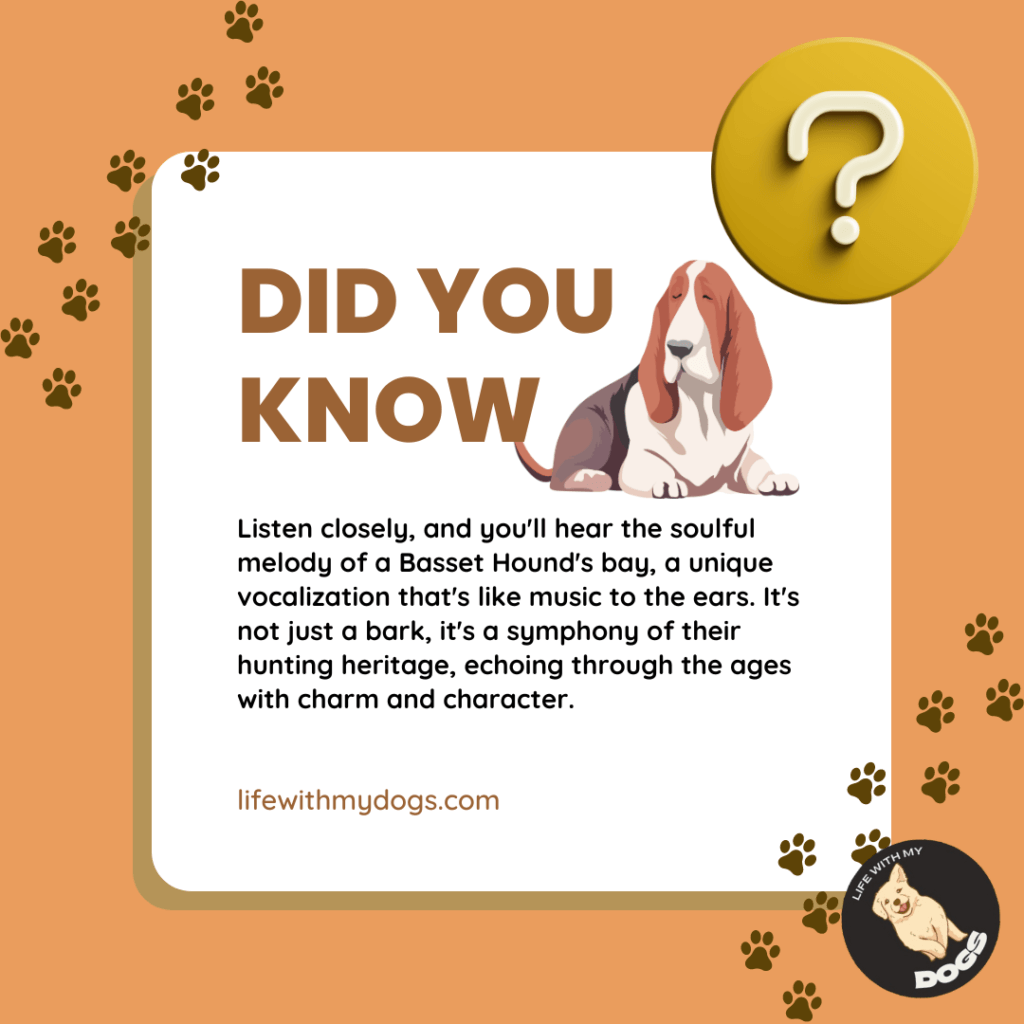
Breed History
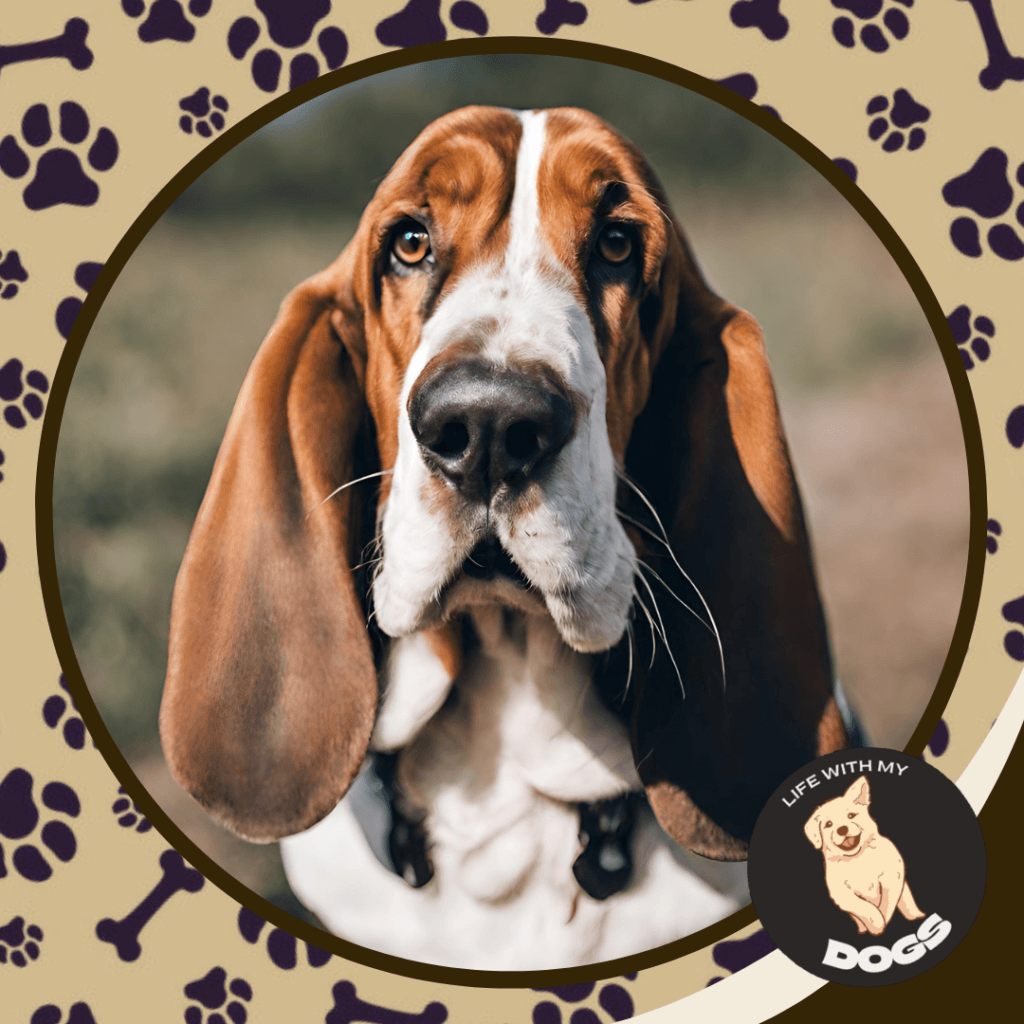
The Basset Hound has a storied past that intertwines with French nobility and the evolution of hunting practices.
Origins of the Basset Hound
Records suggest that early versions of the breed emerged around the 6th century. The term ‘basset’ stems from the French word ‘bas’, meaning ‘low-set’, reflective of the dog’s short, sturdy stature.
Historical Role
Throughout history, Basset Hounds have been esteemed for their exceptional scenting ability. They were developed primarily for hunting small game due to their keen nose and persistence. Their slow pace allowed hunters to follow on foot, and their amiable disposition made them a fixture in royal courts and among the French aristocracy.
Physical Characteristics
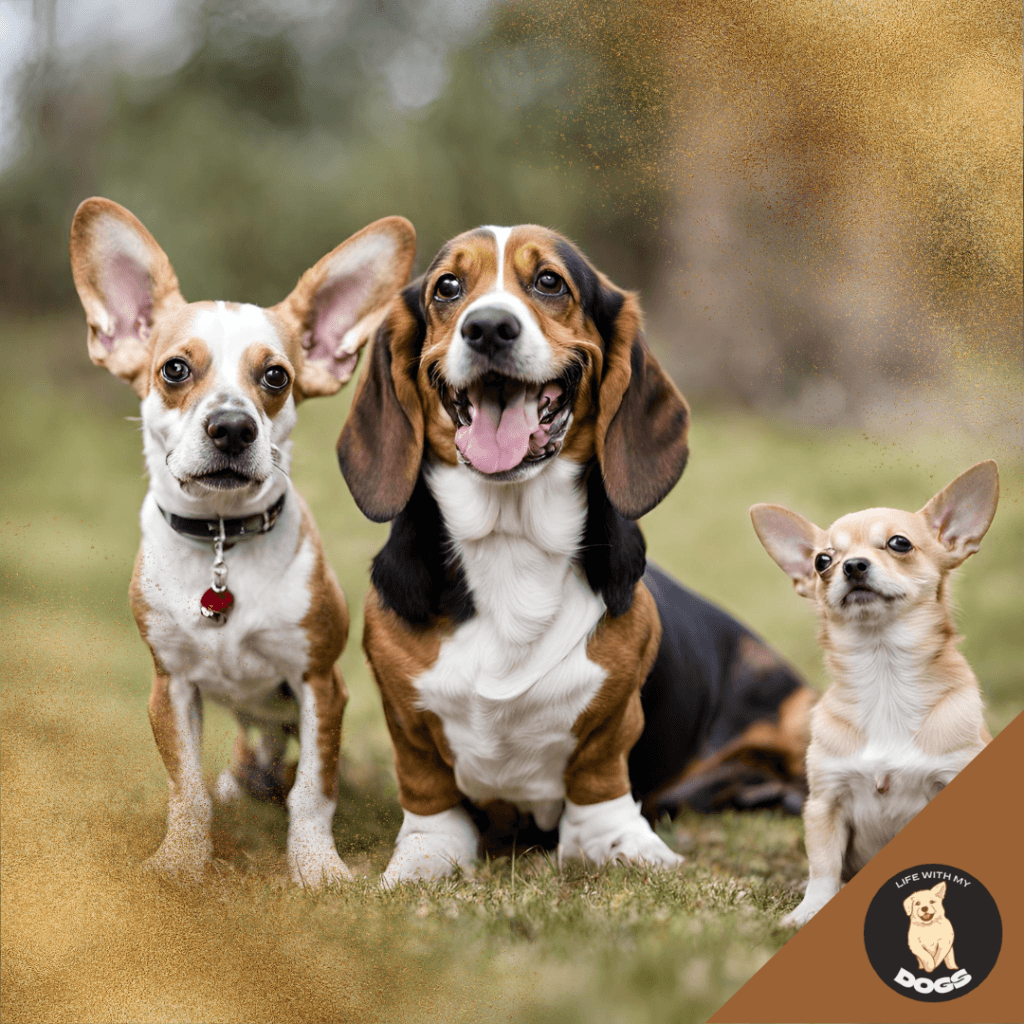
Basset Hounds are an instantly recognizable breed, known for their long ears, droopy eyes, and distinctive body shape which adds to their charm and appeal.
Distinctive Body Structure
Basset Hounds exhibit a unique body structure with short, strong legs that are meant for endurance rather than speed. They have a heavy bone structure with a large, rounded skull and a deep chest. Their loose skin and long, pendulous ears are distinct traits that aid in trapping scents close to the nose while tracking.
Coat and Color Variations
The coat of a Basset Hound is short, smooth, and dense, offering good protection from all types of weather. These dogs come in a variety of color variations, with the most common patterns being tri-color or bi-color, consisting of combinations of white with shades of black, brown, red, or lemon.
Typical Size and Weight
An adult Basset Hound typically weighs between 40 to 65 pounds (18 to 29 kilograms), with females generally being on the smaller side of the scale. Height at the withers ranges from 11 to 15 inches (28 to 38 centimeters), making them shorter in stature compared to other breeds, yet their body is long and well-balanced.
Temperament and Behavior
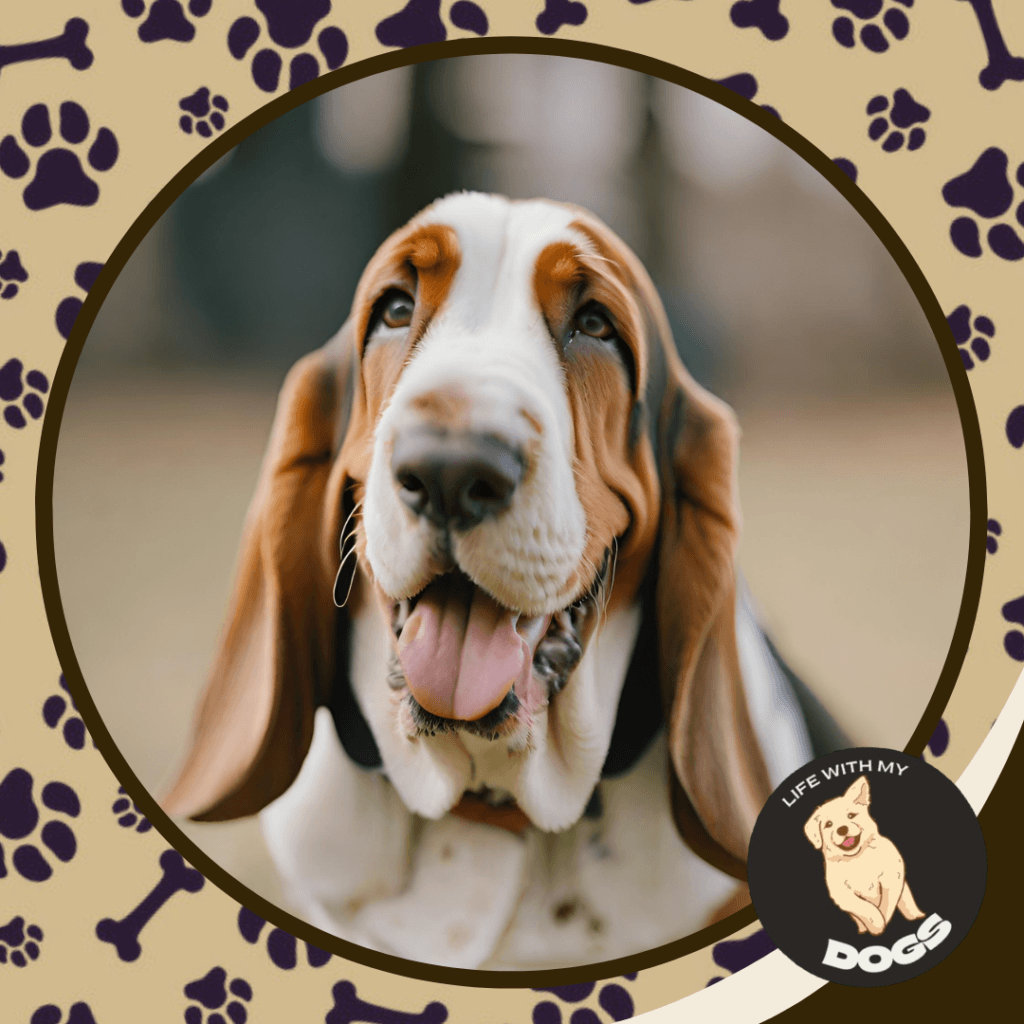
Basset Hounds are known for their calm demeanor and amiable personality. They exhibit a unique blend of patience and a congenial attitude, making them well-suited for families and companionable living.
Personality Traits
Basset Hounds display a pleasant-natured and easygoing personality. Often characterized by a mix of dignity and clownish antics, they generally show a consistent, good-natured temperament. Their sociability extends to both humans and other pets, usually showcasing a peaceful coexistence.
Social Behavior with Humans and Animals
They are notably sociable with strangers, children, and other animals. Originating from a background of pack-hunting, Basset Hounds are inclined to get along well with other dogs and tend to be people-oriented. This breed’s inclination towards friendliness is reflected in their interactions, often characterized by wagging tails and an eagerness to engage.
Trainability and Intelligence
While Basset Hounds are fairly smart, they can be somewhat stubborn when it comes to training. Successful training requires a firm yet patient approach, complemented by creativity. Their intelligence allows them to learn, but their independent nature can require persistent and creative training methods.
Health and Lifespan
Basset Hounds, known for their keen sense of smell and distinctive appearance, face various health challenges and have a lifespan that is influenced by several factors. Understanding these can help owners provide the best care for their dogs.
Common Health Issues
Basset Hounds are susceptible to certain health conditions that prospective and current owners should be aware of:
- Ear Infections: Due to their long, drooping ears, they are prone to ear infections, which require regular cleaning.
- Joint Problems: Conditions such as hip dysplasia and elbow dysplasia are common in the breed.
- Skin Issues: Their loose, wrinkly skin can be susceptible to infections if not properly cared for.
These conditions underscore the importance of regular veterinary check-ups and preventive care.
Average Lifespan
A typical Basset Hound may expect to enjoy a lifespan of 8 to 12 years. Instances of Basset Hounds living up to 17 years have been documented, influenced by genetics and quality of care.
Care and Maintenance Requirements
Proper care can significantly impact the health and longevity of a Basset Hound. Key aspects of their care include:
- Regular Exercise: Moderate daily exercise helps maintain a healthy weight and supports joint health.
- Diet Management: A balanced diet tailored for their needs helps prevent obesity and related health issues.
- Skin and Ear Care: Routine cleaning of ears and monitoring skin folds for signs of irritation or infection are critical for their wellbeing.
Exercise and Nutrition
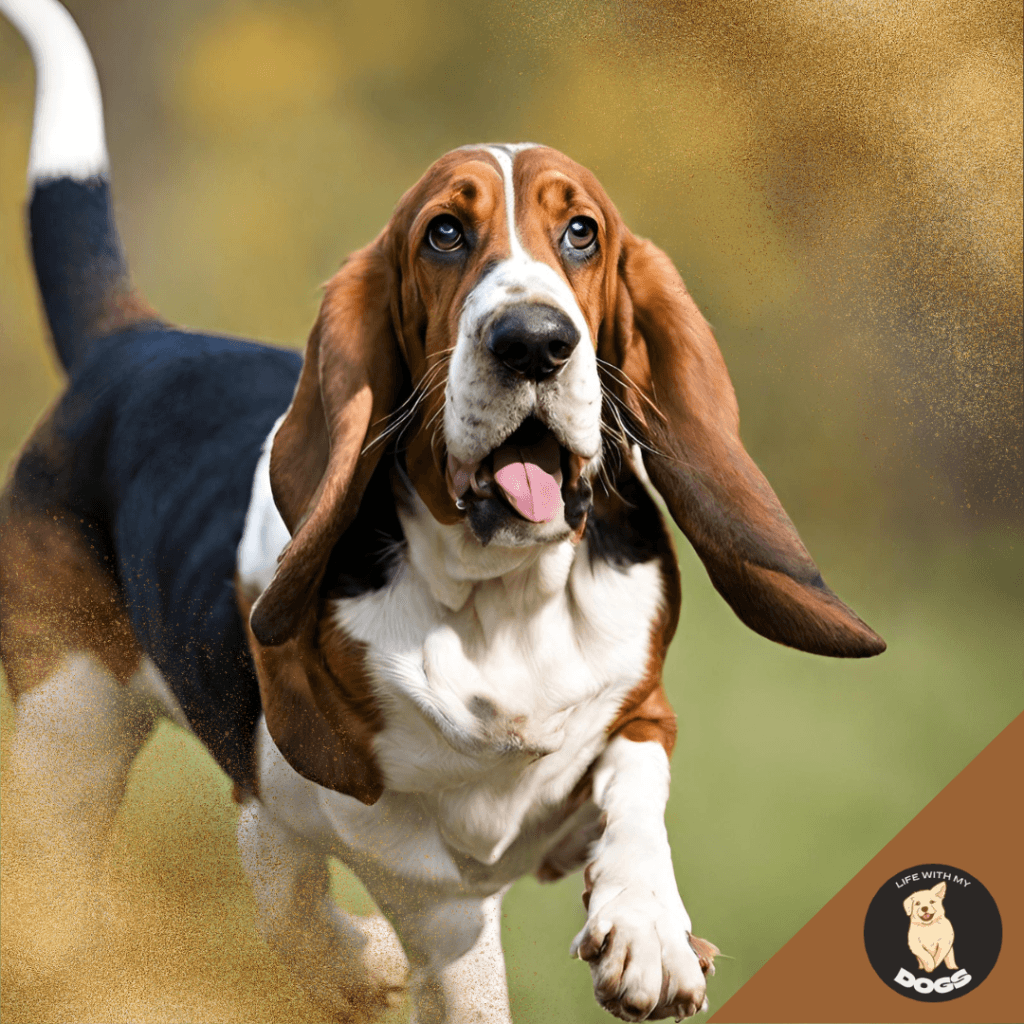
Understanding the dietary and exercise needs of Basset Hounds is vital for their health and well-being. Basset Hounds require a balanced diet and a moderate level of physical activity to maintain their fitness.
Dietary Needs
Basset Hounds have a tendency to gain weight, so their diet should be closely monitored. High-quality dog food appropriate for their age (puppy, adult, senior) is crucial. They typically benefit from:
- Protein: Essential for muscle maintenance.
- Fats: Necessary for energy, but should be given in moderation.
- Carbohydrates: Provide energy and help keep the dog full.
- Fiber: Aids in digestion.
- Vitamins and Minerals: Ensure overall health.
Table 1: Suggested Daily Caloric Intake
| Age | Daily Calories |
|---|---|
| Puppy | 900 – 1200 |
| Adult | 1200 – 1500 |
| Senior | 900 – 1200 |
Adult Basset Hounds typically do well on two meals a day. Care should be taken with treats, which should not constitute more than 10% of their daily calorie intake.
Exercise Requirements
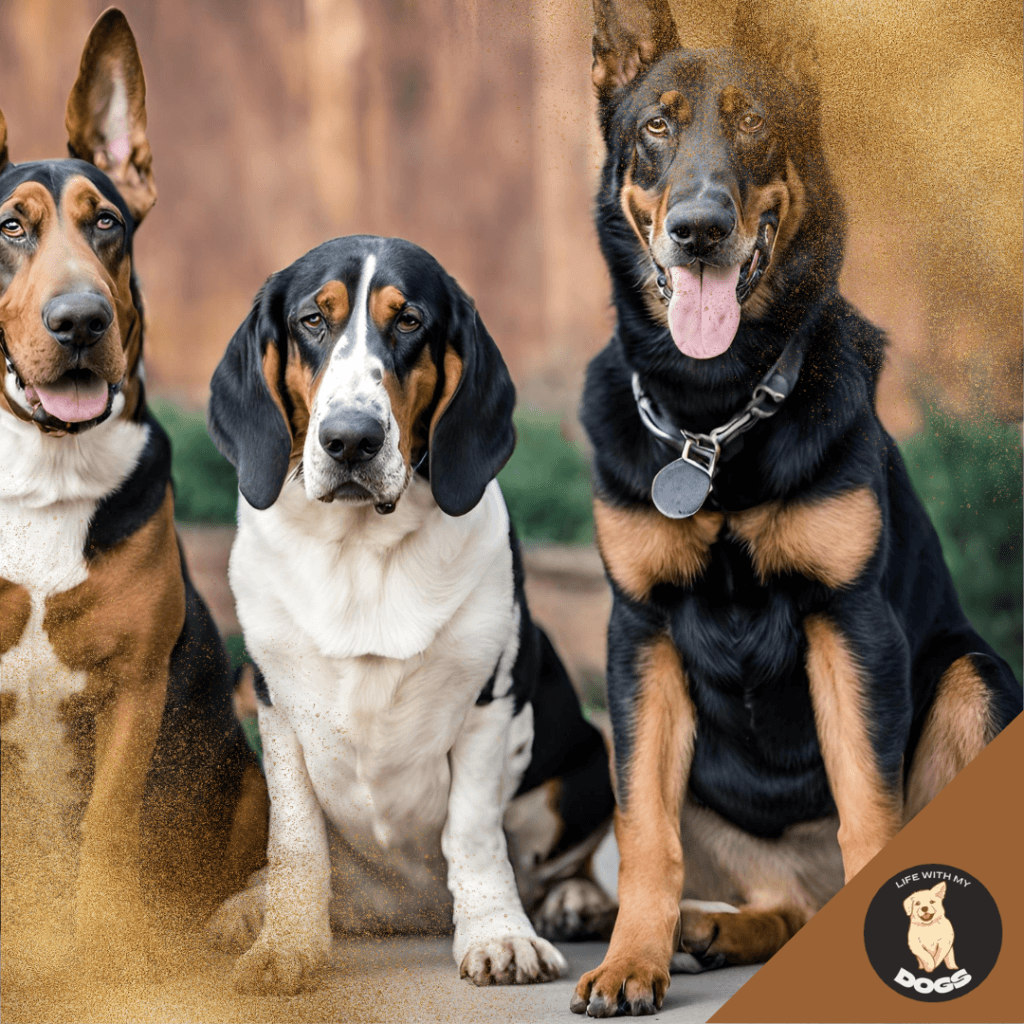
Despite their laid-back reputation, Basset Hounds benefit from regular exercise. Daily walks are non-negotiable to keep them fit. Typically, they require:
- 30 to 60 minutes of exercise per day.
- Activities can include walking, playtime, and sniffing games which take advantage of their keen sense of smell.
Exercise Checklist:
- Daily walk (20-30 minutes)
- Secure play area for off-leash activity
- Mental stimulation (sniffing games, puzzles)
It’s important to remember that Basset Hounds are more likely to engage in scent-related activities than high-speed chases, reflecting their heritage as scent hounds. Exercise should be conducted in a secure area, as their strong instinct to follow scents can lead them to wander off.
Grooming and Care
Proper grooming is crucial for maintaining the Basset Hound’s distinctive appearance and ensuring their comfort. This section provides insight into the breed’s grooming necessities and specific care considerations.
Grooming Needs
Basset Hounds have a short, dense coat that requires regular brushing to minimize shedding and remove debris. They benefit from weekly brushing using a rubber curry brush to loosen dead hair. Following up with a soft bristle brush smooths the coat and distributes natural oils. Although their coat is low-maintenance, it’s essential to regularly check and clean their long ears to prevent infections.
- Brushing: Weekly with appropriate tools.
- Bathing: Periodically, when the dog is noticeably dirty or emits an odor.
- Ear Care: Frequent inspection and cleaning to avoid health issues.
Special Considerations
Basset Hounds are prone to having a stronger body odor compared to other breeds, necessitating occasional baths to keep them smelling fresh. They also require special attention to their wrinkly skin, particularly under their folds, to prevent infections. Owners should prioritize ear care, as their floppy ears can trap moisture and debris, making them susceptible to infection if not kept clean and dry.
Popularity and Breed Clubs
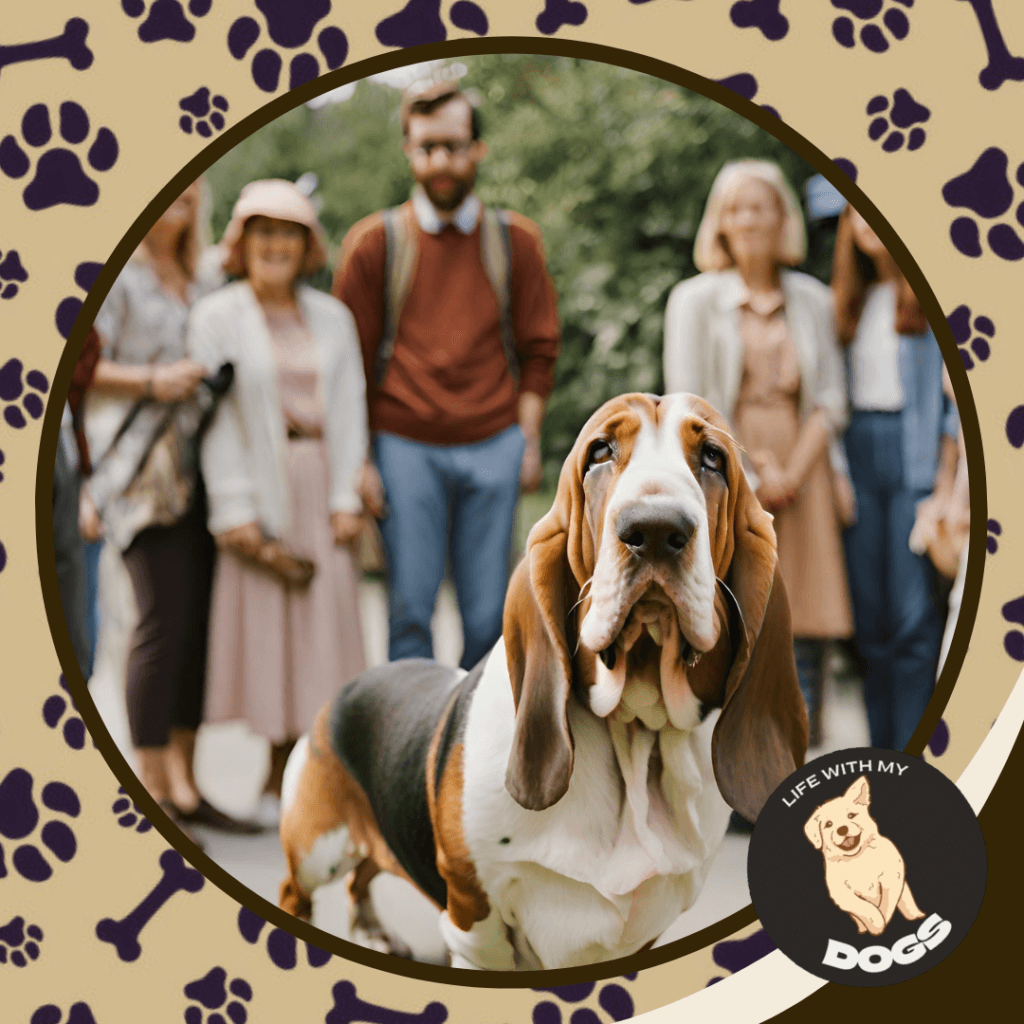
This section explores the Basset Hound’s current standing among dog enthusiasts and the role of breed clubs in maintaining the breed’s standards and community.
Current Breed Popularity
Basset Hounds hold a consistent appeal among dog owners, revered for their keen sense of smell and distinct appearance. Their popularity surged in the 1970s when a Basset Hound named “Cleo” became the official mascot of Hush Puppies shoes, contributing significantly to the breed’s recognition. Despite their stubborn nature, they remain a favored breed for their charm and affability.
Breed Clubs and Organizations
Numerous Basset Hound-specific clubs and organizations exist to support and promote the breed’s interests. The American Kennel Club recognizes the Basset Hound Club of America, which has been instrumental in setting breed standards and organizing events. These clubs play a crucial role in educating owners, facilitating rescues, and preserving the Basset Hound’s historical lineage.
Role in Media and Culture
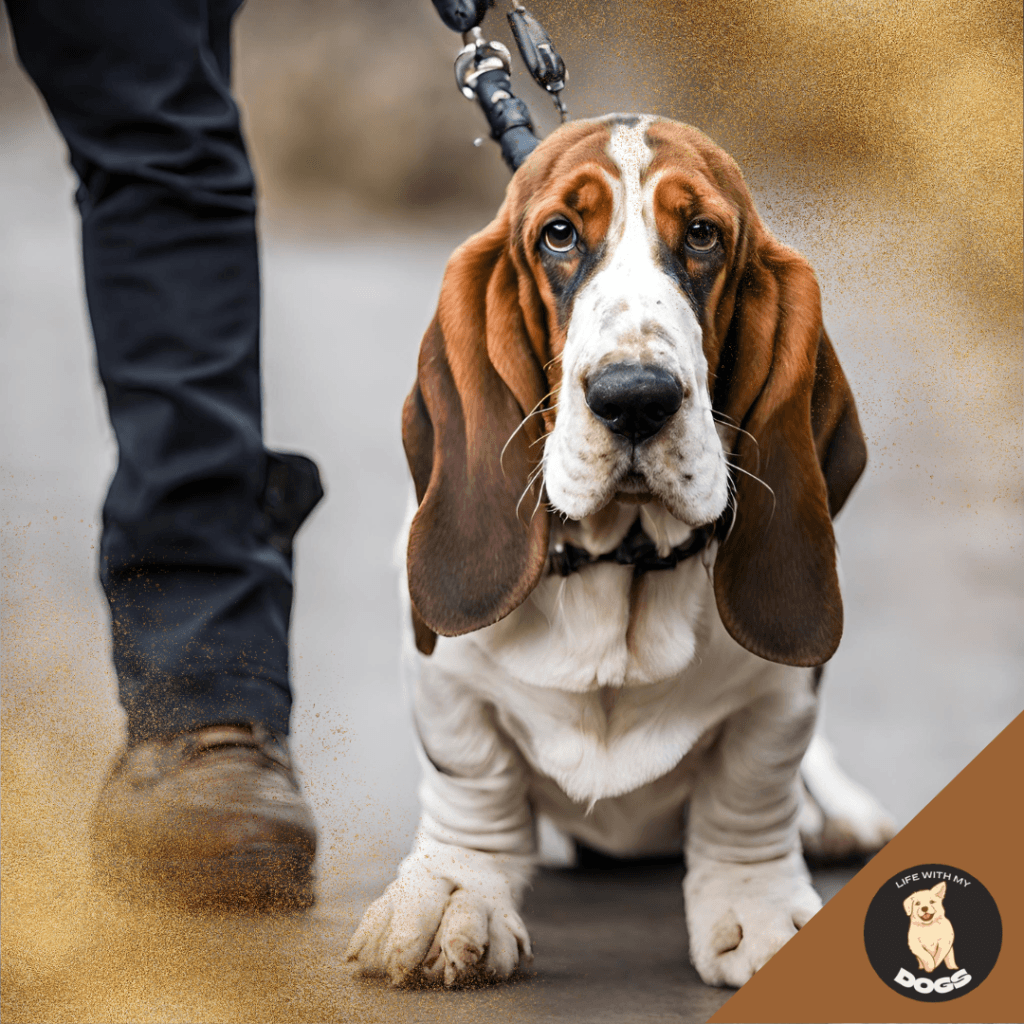
Basset Hounds have established a notable presence in media and culture. They are often recognized for their distinctive physical traits and personality quirks.
Appearances in Films and Books
- Films: Basset Hounds have been featured in a variety of films. Their sad-eyed expression and laid-back attitude have often been used to add a touch of humor or endearment to movies.
- Examples:
- The Sweetest Thing is a comedy where a Basset Hound helps in healing a heartbreak.
- The Great Gilly Hopkins, a family drama, also includes a Basset Hound in its character lineup.
- Examples:
- Books: The breed has been immortalized in literature as well.
- Examples:
- The comic strip Fred Basset has been celebrating the quirks of the breed since 1963.
- Children’s literature, including the “Detective Nosegoode” series, features a Basset Hound as a central character solving mysteries.
- Examples:
Cultural Impact
- Iconic Status: Basset Hounds hold an iconic place in pop culture, symbolizing both comical relief and steadfast companionship.
- In Advertising: Their image is often used in advertisements to evoke a sense of trust and reliability due to their calm demeanor and friendly appearance.
- Mascots and Symbols: They serve as mascots for various brands and have become synonymous with a type of gentle, if slightly melancholic, charm.
- Examples:
- Hush Puppies, the footwear brand, uses a Basset Hound as its logo, illustrating the breed’s widespread recognition and appeal.
- Examples:
Choosing a Basset Hound

When selecting a Basset Hound, it’s crucial to consider the breed’s specific needs and traits. You should also prioritize choosing a responsible breeder who prioritizes the health and wellbeing of their dogs.
Selection Criteria for Adopting
When adopting a Basset Hound, one should assess whether their lifestyle and environment are suitable for the breed’s characteristics.
Basset Hounds are recognized for their gentle disposition and exceptional sense of smell, traits that demand appropriate engagement and space to thrive.
Prospective owners should consider:
- Exercise needs: Moderate; they enjoy walks but are not overly energetic.
- Space requirements: Suitable for houses with yards; however, they can adapt to apartment living if well-exercised.
- Temperament: Friendly and laid-back, yet they may exhibit persistence when tracking scents.
- Health considerations: Prone to ear infections and obesity; regular check-ups are advisable.
Responsible Breeding Practices
Choosing a Basset Hound from a breeder who adheres to responsible breeding practices is essential for the health and longevity of the dog.
Prospective owners should look for breeders who:
- Health test their dogs: Ensure parents are screened for common genetic issues like hip dysplasia or glaucoma.
- Provide a clean and enriched environment: Puppies should be raised in a home environment with ample human interaction.
- Are transparent: A reputable breeder will happily discuss their breeding practices and allow you to meet the puppy’s parents.
Facts About Basset Hounds: Timeless Charm, Unwavering Loyalty
Basset Hounds stand as enduring symbols of loyalty, companionship, and charm, tracing their roots back to French hunting nobility. With their droopy eyes, velvety ears, and amiable disposition, they have captured the hearts of dog lovers worldwide. From their remarkable olfactory abilities to their distinctive appearance in media and culture, Basset Hounds continue to hold a special place in our hearts and homes.
If you’re considering welcoming a Basset Hound into your family, remember to prioritize responsible adoption or choose a reputable breeder who prioritizes the health and well-being of their dogs. Whether you’re drawn to their gentle nature, their affectionate demeanor, or their unmistakable presence, owning a Basset Hound promises years of companionship and joy. Take the time to understand their needs, provide them with proper care and attention, and embark on a journey filled with wagging tails and endless love. Consider adding a Basset Hound to your life and experience the unwavering loyalty and affection that this beloved breed has to offer.
Frequently Asked Questions
These key questions address the health, training, personality, care, lifespan, and hunting capabilities of Basset Hounds, providing essential information for current and prospective owners.
What are the common health problems in Basset Hounds?
Basset Hounds can be prone to specific health issues such as obesity, ear infections due to their long droopy ears, and joint problems including hip dysplasia.
Owners should closely monitor their health and consult with a veterinarian to manage these conditions proactively.
What are the personality traits and temperament of Basset Hounds?
Basset Hounds are known for their calm, friendly, and somewhat stubborn personality. They exhibit great patience, making them good family pets.
Despite their laid-back nature, they can be very determined, especially when following a scent.
How can you train a Basset Hound effectively?
Training a Basset Hound requires patience, consistency, and positive reinforcement due to their independent nature.
They respond well to treats and are motivated by food, but trainers should be mindful of their tendency towards obesity.
What is the average lifespan of a Basset Hound?
The average lifespan of a Basset Hound is typically between 10 to 12 years.
Regular exercise and a healthy diet are crucial in helping them reach their full life expectancy.
What type of care do Basset Hound puppies require?
Basset Hound puppies need plenty of socialization and gentle training to grow into well-adjusted adults.
They also require routine health checks to prevent common issues such as ear infections and weight gain from an early age.
What is the hunting history and capability of Basset Hounds?
Basset Hounds were originally bred for hunting small game. This is due to their exceptional sense of smell and persistence.
Their slow pace made them ideal for hunters on foot. They continue to excel in scent work and tracking today.
